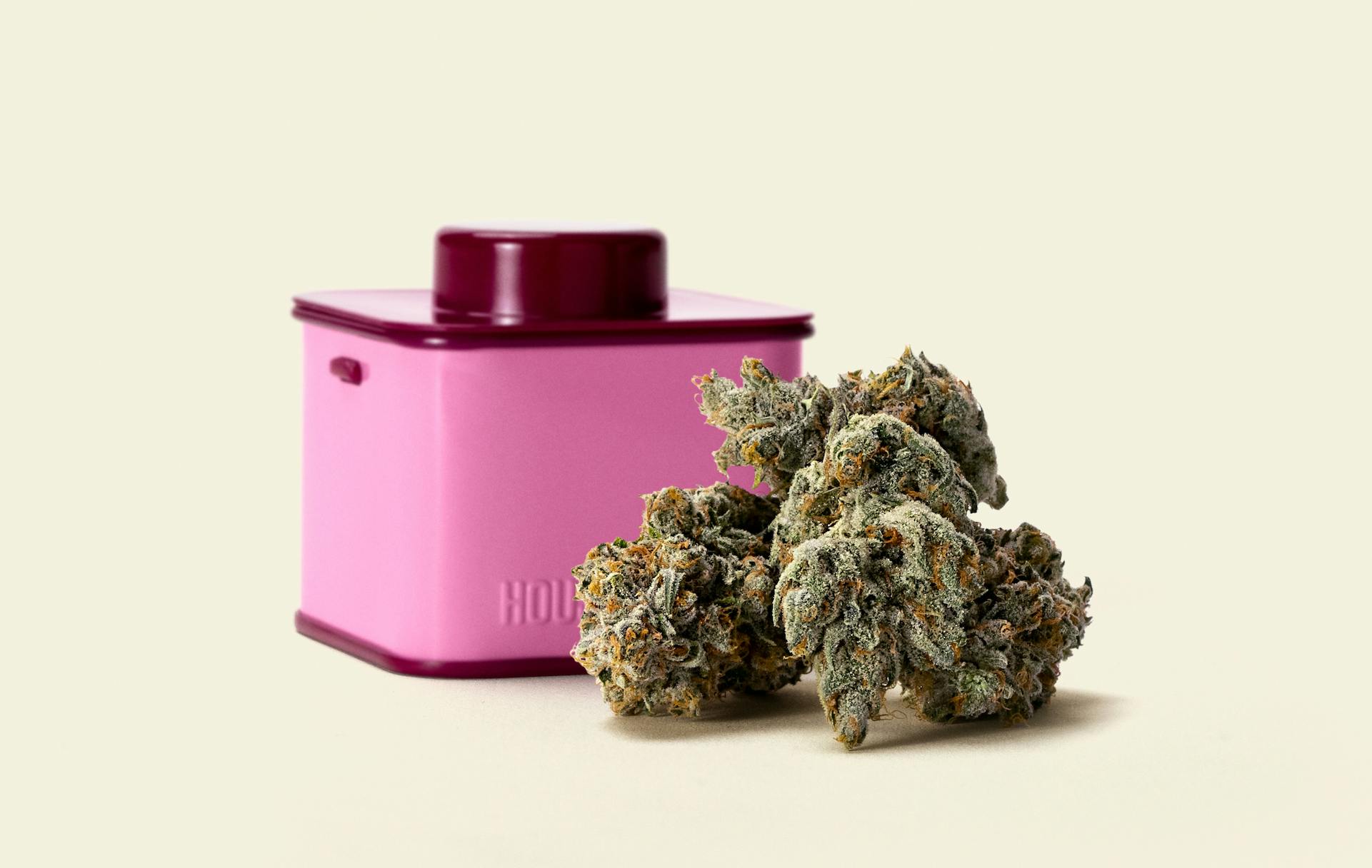It’s been one week since the announcement that Seth Rogen would be leaving the Canadian cannabis industry—and taking his brand Houseplant with him.
Seth Rogen parting ways with Canopy Growth doesn’t signal the end of celebrity-backed weed in Canada. But lately it feels like a bit of a revolving door in Canada, watching celebrities like Rogen, Drake, and others, exit our cannabis industry for greener pastures.
The good news? In Houseplant’s case, it might only be temporary.
Houseplant plans to relaunch in the Canadian market in the future with products more consistent with its US offerings.
“Canada is where it all started—for us as people, and for the brand,” Rogen said in last week’s news release. “This is not an exit from the Canadian market, but a chance for us to evolve the brand.”
However, Rogen’s (temporary?) departure from Canadian cannabis speaks to a larger industry issue with brands in general.
Not all breakups have to be ‘Superbad’
Canopy and Houseplant worked together for more than three years. According to both parties, this recent decision was mutual. The relationship was fruitful, the pair were amicably riding the legalization train. And now—as in any breakup—both parties will pursue other opportunities on their own.
“Our work with Houseplant began pre-legalization and we’re proud of what we’ve delivered to consumers,” Rade Kovacevic, Canopy’s chief product officer, told Leafly. That includes, Kovacevic said, “the role this collaboration has played in defining what premium means within the Canadian market.”

Houseplant US vs Houseplant CAD
Houseplant made its US debut earlier this year, an announcement that was so popular it nearly broke the internet.
The excitement was palpable and vaguely reminiscent of the elaborate release in Canada, complete with vinyl records and some of the nicest branded swag at the time. Since March, demand in the US has gone through the roof—with sales to match.
The success of Houseplant in the states highlighted the cracks in the brand’s Canadian presence. The weed itself is getting glowing reviews—fragrant, spicy, and loud.
Consumers in Canada haven’t been so kind to the Houseplant brand. When the question was posed on Twitter on why Rogen left the Canadian market, consumers roasted the brand with responses like ‘it means he finally tried some?’ and ‘nothing, nobody cared anyways’.
It appears the brand’s success in the US prompted company officials to rethink their Canadian presence.
“The recent launch of Houseplant in the United States has given us a clear benchmark for what Houseplant stands for, and how we plan to bring the brand to life globally,” said Michael Mohr, Houseplant’s co-founder and CEO.
“While our collaboration with the Canopy team has been fruitful and we continue to hold similar views on the opportunities ahead, we believe the time is right for us to focus on Houseplant independently.”
According to the press release, beverages remain the highlight of the brand’s success—namely Houseplant’s grapefruit-flavoured sparkling water. Despite being the top-selling beverage in Canada, with over one million cans sold, consumers must say goodbye to Houseplant’s entire product roster.
If you’re a fan of their products, now is the time to snap up what’s left on the shelves. In Canada, some Houseplant cannabis products will continue to be available to retailers through the end of Sept. 2021.
Celebrity and the Cannabis Act
If Houseplant is skyrocketing in the US, while its Canadian presence remains steady but unspectacular, could our restrictive promotional laws be to blame?
Marketing regulations are super tight in Canada. Brands aren’t able to depict anything that could be associated with promoting a certain lifestyle. Legally speaking, Seth Rogen couldn’t even say “Smoke my weed, it’s good,” on social media in Canada without violating the Cannabis Act.
The difficulty of capitalizing on a famous name in the cannabis space comes as no surprise to Trina Fraser, a lawyer and partner at Brazeau Seller Law, and one of Canada’s leading authorities on cannabis law.
“Everybody knew what the rules were when we kind of cruised into legalization in 2018,” she told Leafly. “No testimonials or endorsements, no depictions of a person or lifestyle, all of that stuff, it was always there [in the regulations].”
Those restrictions have always stipulated no celebrity endorsements.

Fraser, who isn’t involved in this case, explained the original intent behind the law: “The fear is that if we allow all these kinds of ‘sexy’ celebrity associations and glamour depictions, it will influence consumers and normalize [cannabis use].”
Because of those restrictions, “it becomes very difficult to build brands around personalities,” Fraser added. “When you look at places like Colorado and California, they are years ahead of us in trend development on cannabis products.”
Even though the regulations laid it out from the get-go, there was a hope that simply having a celebrity owner would drive sales. Fraser explains that when it comes to celebrities, the real surprise to producers, was that their presence didn’t really matter all that much.
“Seth Rogen, or any celebrity really, doesn’t need to be on the product or advertising for customers to know it is their brand,” Fraser said. “Whatever boost their involvement gave to the brand or products was inherently there.”
“The surprise to producers was that [being associated] with someone famous just didn’t have the inherent value that they thought it was going to.”
Celebrity partners aren’t as influencial in Canada
Houseplant’s US experience has been dramatically different than its Canadian rollout. Consumers in the US, and particularly in California, seem to prioritize celebrity-backed brands.
Who wouldn’t want to spark up the same cannabis as Seth Rogen, Snoop Dog, or Willie Nelson? As fans, there’s an excitement that comes with smoking the same pot as your favourite celeb.

In Canada, that trend doesn’t seem to be as prominent. “Less than 1% of consumers have asked me for a specific celeb’s cannabis brand,” said Brian Kierans, a Canadian budtender and cannabis consultant.
Kierans said few customers ever come in asking for “Seth Rogen pot” or “Drake’s weed.”
“I’m not sure what value celebrities bring to cannabis brands and products,” he said. “Consumers shop by format and strain primarily, in my experience”
“I’ve heard more excitement about Houseplant from budtenders than customers,” added Kierans. “Houseplant had a few loyal customers that talked about Seth when purchasing the cannabis. But it was never a selling or discussion point for a new buyer.”
Brand loyalty nearly impossible in current market
Celebrity departures like this are a symptom of a bigger problem—brands don’t have distinguishable identities in Canada’s cannabis market.
“Brands have trouble distinguishing themselves under the current regulations,” Fraser said. “I would even take it beyond a ‘celebrity’ kind of brand issue to brands in general.”
“There really aren’t any inherently super strong valuable cannabis brands in the regulated market in Canada,” she added. “Not to say that there never will be. I just don’t think we’re there yet.”

It’s nearly impossible to establish a strong brand identity under the Cannabis Act’s restrictions on promotion and endorsement. And that’s left cannabis companies in a tight spot. Without brand identity, it’s extremely difficult to garner brand recognition or much in the way of consumer loyalty.
“The split speaks to where the cannabis industry is right now,” said Kierans. “Early on, many celebrity deals were inked under the belief that endorsements would support sales. It’s clear now that’s not the case.”
“I don’t think that customers really care about celebrity brands. I think they see right through them,” Kierans added. “Brands need to consider what they offer consumers—other than just their name.”








